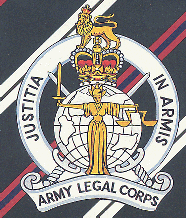Army Legal Corps
| Army Legal Services Branch | |
|---|---|
|
Cap Badge of the former Army Legal Corps
|
|
| Active | 1978, 1992 within AGC |
| Country | United Kingdom |
| Branch | British Army |
| Size | Approx. 120 Commissioned Officers |
| Part of | Adjutant General's Corps |
| Motto(s) | Justitia in Armis |
| March | Scales of Justice |
| Commanders | |
| Director General | Susan Ridge |
| Insignia | |
| Tactical Recognition Flash |  |
The Army Legal Services Branch (ALS) is a branch of the Adjutant-General's Corps (AGC) in the British Army. Before 1992, the branch existed as the independent Army Legal Corps (ALC).
Many of the functions of the ALS were once carried out by the Judge Advocate General (JAG) whose own origins can be traced back to Medieval times. Following World War I, the growing demand for legal services within the army, led in 1923 to the creation of the Military Department of the Office of the Judge Advocate General.
The Directorate of Army Legal Services was formed from the JAG's office on 1 October 1948 and would go on to receive full corps status as the Army Legal Corps on 1 November 1978. It was always the smallest corps in the Army. On 6 April 1992, the corps became the Army Legal Services Branch of the Adjutant General's Corps, but retains a separate identity and its own cap badge.
Army Legal Services Branch is structured as follows:
The ALS posts a number of its Officers to the Service Prosecuting Authority (SPA). The most senior military officer in the organisation is a Brigadier of the ALS who is the Deputy Director Service Prosecutions. Officers of the SPA prosecute cases at Court Martial and where appropriate Service Civilian Court. They also act as respondent in the Summary Appeal Court and represent the Crown at the Court Martial Appeal Court.
The SPA has its HQ and UK Office at RAF Northolt, in Northwest London. It also maintains an office in Bielefeld, Germany.
The Advisory Branch of ALS advises the chain of command on a wide variety of administrative, operational and criminal law issues. There are advisory Officers in every major Army HQ around the world. Typically they advise on matters including: whether Commanding Officers should initiate disciplinary procedures for soldiers, Boards of Inquiry, whether administrative action should be taken against those suspected of breaching the Army's values and standards, how the Army should deal with grievances and other employment law related issues, delivering training on disciplinary/administrative processes and on emerging Army policies. Advisory branch Officers often work directly with the Army’s most senior commanders.
...
Wikipedia

